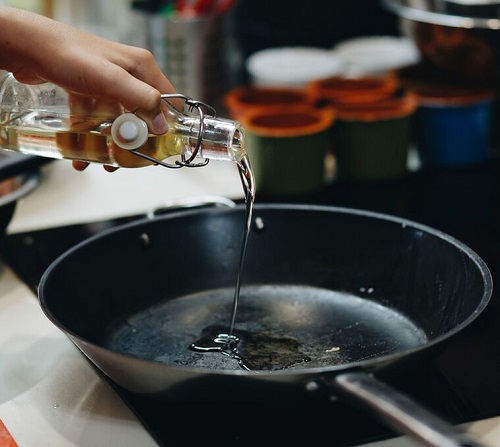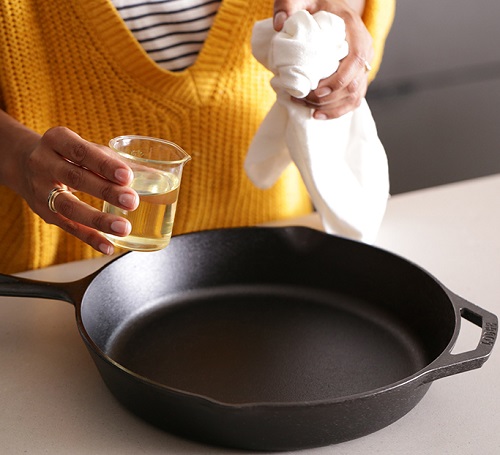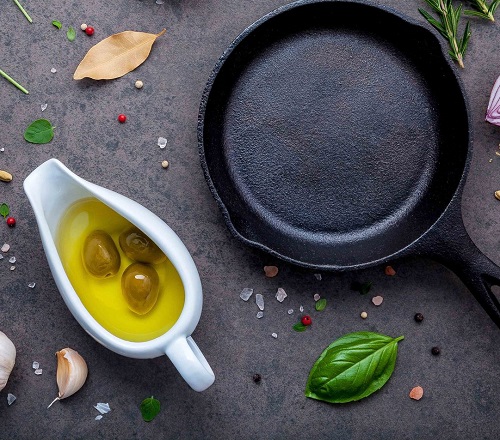Selecting the Best Oil for Seasoning Cast Iron will ensure your cookware lasts long without any wear or tear!
Seasoning cast iron cookware is crucial for maintaining its longevity, non-stick surface, and overall performance. The type of oil you use for this process can significantly affect the seasoning’s quality. This guide will help you in Selecting the Best Oil for Seasoning Cast Iron while giving you a walkthrough of the process!
Why Season Cast Iron with Oil?
When it comes to maintaining the longevity and high-quality performance of your cast iron cookware, the process of seasoning is key. This process involves coating the pan with a thin layer of oil and heating it to create a protective layer known as “seasoning.” This layer not only prevents rusting but also creates a naturally non-stick surface, which improves with every use.
Additionally, the oil used for seasoning can impart a unique flavor to your dishes, enhancing the overall cooking experience. Remember, the type of oil matters—choose one with a high smoke point, for the best results.
What Oil to Season Cast Iron?
1. Avocado Oil
Renowned for its high smoke point, avocado oil is excellent for seasoning cast iron. Its high heat tolerance supports the formation of a durable protective layer, ensuring your cookware stands up to even the most demanding culinary tasks.
2. Coconut Oil
Although its smoke point is moderate, coconut oil is a widely available and health-conscious choice. Its unique aroma adds an enticing extra flavor dimension to your meals, making your dishes taste as great as they look.
3 Peanut Oil
Thanks to its high smoke point and rich flavor, peanut oil is a popular option for seasoning cast iron. Its robust properties not only protect your cookware but also enhance the taste of your food.
4. Safflower Oil
Safflower oil is highly resistant to oxidation and has a high smoke point, making it a robust choice for seasoning cast iron. This resistance ensures a long-lasting and durable seasoning, extending the lifespan of your pan.
5. Sesame Oil
While its smoke point is lower than other oils, the unique nutty flavor of sesame oil can add a distinct touch to your dishes when used for seasoning, offering a delightful culinary twist.
6. Soybean Oil
Found commonly in vegetable oil blends, soybean oil is an affordable and effective option for seasoning. It forms a decent protective layer, maintaining your pan in good form and ensuring its longevity.
7. Corn Oil
Corn oil, popularly used for frying, is effective for seasoning your cast iron cookware due to its moderate smoke point. Its consistency allows for a smooth layer, improving your cooking surface.
8. Lard
Although it’s not an oil, lard is a traditional seasoning agent. It provides a durable layer that withstands high cooking temperatures, and it adds a rich flavor to your dishes.
9. Palm Oil
With a high smoke point and oxidative stability, palm oil is a potent seasoning despite its controversial production. It forms a resilient layer, protecting your cast iron from damage.
10. Cottonseed Oil
Often used in processed foods and for frying, cottonseed oil’s moderate smoke point makes it a viable choice for seasoning. It’s relatively stable under heat and creates a smooth, non-stick surface.
11. Rice Bran Oil
Known for its high smoke point, rice bran oil is an excellent choice for seasoning cast iron. It holds up well under high heat, ensuring a robust and durable protective layer.
12. Walnut Oil
Primarily used in salad dressings and baked goods, walnut oil can season your cast iron due to its relatively high smoke point. Its unique flavor adds a gourmet touch to your dishes.
13. Flaxseed Oil
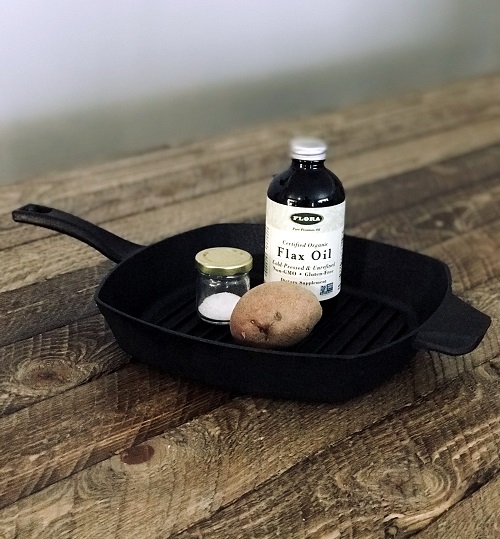
Chosen by many for its excellent drying properties, flaxseed oil polymerizes well into a hard, protective layer on the cast iron surface when heated, providing optimal protection for your cookware.
14. Canola Oil
It’s affordable, readily available, and has a high smoke point, making canola oil an effective choice for seasoning cast iron. It forms a durable protective layer, keeping your pan ready for use.
15. Grapeseed Oil
Grapeseed oil offers affordability and a high smoke point, making it a good option. Like canola, it forms a solid seasoning layer, protecting your cookware from rust and damage.
16. Olive Oil
Popular in many kitchens, olive oil can be used for seasoning despite its lower smoke point. It imparts a distinctive flavor, adding a Mediterranean twist to your meals.
17. Sunflower Oil
With its high smoke point, affordability, and wide availability, sunflower oil is a practical choice. It forms a resilient layer that stands up to regular use and high cooking temperatures.
18. Vegetable Shortening
Vegetable shortening is a time-tested choice for seasoning due to its easy application and high smoke point. Being solid at room temperature, it creates a uniform, non-stick surface on your cast iron cookware.
Three Best Oils to Choose for Seasoning Cast Iron
With a plethora of options available, you may wonder which oil stands out as the top pick for seasoning your cast iron cookware. Based on factors such as smoke point, availability, cost, and health benefits, the following three oils emerge as top contenders:
1. Seasoning Cast Iron with Avocado Oil
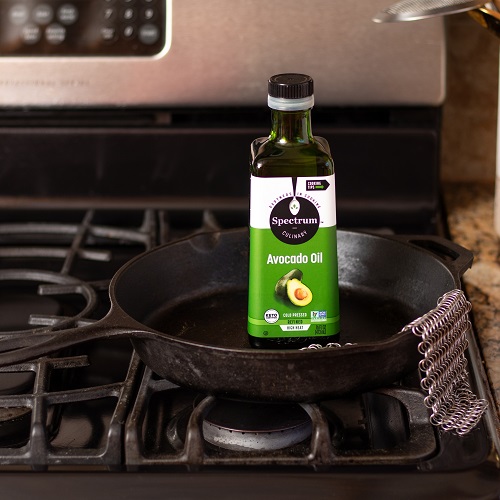
With one of the highest smoke points at around 520 degrees Fahrenheit, avocado oil is an excellent choice for seasoning. It’s less likely to smoke and can form a durable, hard layer on your cast iron cookware. In addition, avocado oil is rich in heart-healthy monounsaturated fats, adding a health benefit to its high functionality.
2. Seasoning Cast Iron with Grapeseed Oil
Grapeseed oil also ranks high for its high smoke point of approximately 420 degrees Fahrenheit. Its neutral flavor makes it an attractive option for those who prefer not to have their seasoning oil impart any additional taste to their dishes. Moreover, it’s a widely available oil, which means you can easily find it in your local supermarket.
3. Seasoning Cast Iron with Flaxseed Oil
While flaxseed oil has a lower smoke point than the other two oils, it’s often touted as the best oil for seasoning cast iron. This is due to the hard, food-safe surface it creates when polymerized. It’s a bit pricier and less readily available, but many consider it worth the extra effort and cost for the durable seasoning it produces.
Steps to Season Cast Iron with Oil
Seasoning creates a nonstick cooking surface and protects the pan from rusting. Here’s a step-by-step guide on How to Season Cast Iron Using Oil:
What You’ll Need:
- Cast iron pan
- Mild dish soap
- Non-abrasive scrub brush or sponge
- Clean, dry cloth or paper towels
- Oil of your choice
- Oven
Instructions:
-
Clean the Cast Iron Pan
Begin by cleaning your cast iron pan. Use warm water, mild dish soap, and a non-abrasive scrub brush or sponge to clean off any food residues or rust spots. Rinse thoroughly to remove all soap which can interfere with the seasoning process.
2. Dry the Pan
Immediately dry the pan using a clean cloth or paper towel. This step is crucial to prevent rust formation. You can also place it on a stove burner over low heat for a few minutes to make sure all water evaporates.
3. Apply the Oil
Once the pan is completely dry, apply a thin layer of your chosen oil to the entire surface of the pan, including the exterior and handle. You can use a cloth or paper towel for this purpose.
4. Remove Excess Oil
With a clean, dry cloth or paper towel, wipe off any excess oil from the pan. The surface should be glistening but not dripping. Too much oil can result in a sticky surface instead of the desired slick one.
5. Heat the Pan
Place the pan upside down in a cold oven. This positioning ensures that any remaining excess oil will not pool in the pan but drip out. You may want to put a piece of aluminum foil or a baking sheet on the lower rack to catch any drips.
Now, turn the oven to a temperature between 450 to 500 degrees Fahrenheit.
6. Bake the Pan
Bake the pan for about an hour. This process will cause the oil to polymerize, forming a hard, protective layer on the pan’s surface.
7. Cool Down
After an hour, turn off the oven and let the pan cool inside it. Cooling slowly helps the seasoning to set correctly.
8. Repeat if Necessary
For a new pan or one that was severely stripped or rusted, you may want to repeat the seasoning process (steps 3 to 7) two or three times to establish a good base layer of seasoning.
Tip: Remember to lightly oil the pan after cleaning and drying it every time to maintain the seasoning and keep your cookware in prime condition.
Key Takeaways
In conclusion, seasoning cast iron cookware is an essential process to enhance its longevity, performance, and non-stick qualities. The type of oil you choose can impact the quality of the seasoning layer you create. Choose one with higher smoke points and ensure to apply a thin layer of oil. Also, allow the cookware to cool in the oven after baking to create a solid and long-lasting seasoning.
Furthermore, depending on your frequency of use, you should consider re-seasoning your cast iron every few months. Through this guide, we hope you now feel equipped to choose the right oil for seasoning your cast iron cookware and can undertake the process with confidence. Happy cooking!
Frequently Asked Questions
1. Can I Use any Oil for Seasoning My Cast Iron?
While technically, you can use any oil, those with higher smoke points tend to work best. This is because they can withstand higher temperatures without breaking down, forming a better-polymerized layer on the surface of your cast iron.
2. How Often Should I Season My Cast Iron?
How often you need to season depends on how frequently you use your cast iron cookware. If you cook with it regularly (several times a week), seasoning once every couple of months should suffice. However, if you notice food starting to stick or any visible rust, it’s time to re-season.
3. Can I Use Butter or Margarine for Seasoning?
Butter and margarine contain water and salt, which may lead to inconsistent seasoning results. Stick to pure oils for the best outcome.

